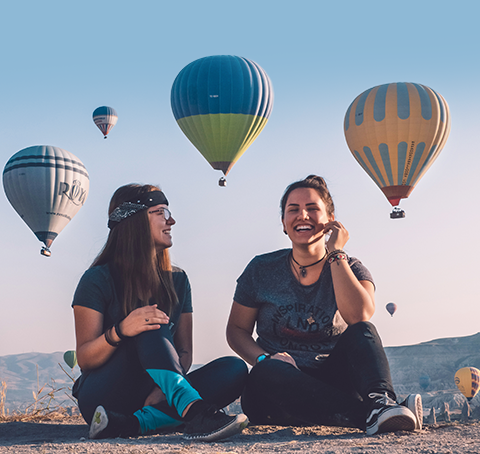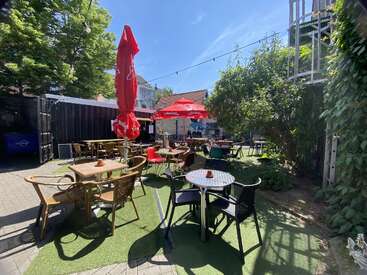Informações do perfil

Classificação do anfitrião
100 %

Last replied
31 jan. 2026

Taxa de resposta
100.0 %
Normalmente responde dentro 4 dias

Comentário
3

E-mail verificado
Medalhas (2)



Encontre o anfitrião perfeito
Detalhes

Descrição
The project is a non-profit institution
The project was born on March 16, 2000 to protect adolescents and youth at risk who live on the street by providing them with food, training, education and a place to live.
The project is being developed in Bolivia, in the city of El Alto, the second most populous municipality in Bolivia, and one of the places where inequalities and complications for access to labor needs are most suffered due to lack of training, education and due to to high crime rates and the extreme poverty rate exceeds 34% in rural areas.
The project was created with the purpose of assisting "street kids" who roam and survive in the streets of the La Ceja area of the city of El Alto and the area of the General Cemetery of La Paz. On the street, young people are immersed in practices such as inhalants, alcohol, drugs and gambling, dangerous for their development and health and persecuted by law. In this environment, they survive as they can, mistreated by society and the police. Not having the means of subsistence, they are forced into crime, which entails police reprisals that usually lead to mistreatment and a general contempt for society. As a Reception and Social Reintegration Project, these children are given an opportunity to feel loved, valued, and to be protagonists of their own change in their lives. At home they are offered the opportunity to get off the street and become part of society. For this, it is essential to hold workshops where they can express their dreams and concerns to improve their quality of life and share in the community, creating a family environment. Daily routines such as cleaning and cooking are part of the daily occupations of the boys, and are considered as a pedagogical method in the progression of acceptance from the moment they arrive to the adaptation of following work rules. Finally, our goal is for these people to find their potential and develop their skills to carry out a job and a decent life.
The project has just completed 23 years in which different rehabilitation methods have been verified. There are reinserted boys with completed high school, higher technical or university studies. Some of the boys are still working today on the operation of the project itself, which not only increases the hope of the boys, but also creates a bond of empathy that helps the boys feel understood, a main factor in capturing their interest and make them understand the conditions that reinsertion entails.
Our challenge is to improve the quality of life of children in high-risk situations related to alcohol, drugs and crime with concrete rehabilitation steps, individual and group therapies, accompanying them and supporting them in the healing of their wounded stories and reintegration into society and their families, offering them a comprehensive education, training them in basic, technical, craft and university training. This work is essential to change the quality of life of a population that sees its growth options diminished. Some of the boys who finished their studies and received technical training currently work in countries like Brazil or Argentina due to the lack of opportunities in the country. Avoiding these forced migrations is part of what is intended to change with trained young people and with options for personal or associated entrepreneurship.
In addition to the work of welcoming and training the children who live in the project, the project has integrated other children from a nearby school in the different trainings that have been carried out such as solar tents, bakery, pastry, sewing and pottery.
Different benefits have been seen with this new line of work, on the one hand, foster children benefit from contacting other young people their age and create personal bonds, increasing their self-esteem and favoring their interest in reintegration. On the other hand, we found a change in the vision of the school kids about "the street kids", considerably reducing social marginalization and transmitting this feeling to an entire neighborhood that is becoming aware that "the street kids street" are nothing more than "poor, unfortunate boys" thus stripping themselves of the idea of social dispossession that so abounds in society. We are convinced that it is necessary to provide them with an opportunity so that they can feel loved, valued, and be protagonists of their own change in their lives. The project offers them the possibility of carrying out biweekly training workshops where they can express their dreams and concerns to improve their quality of life, in addition to having sports days that allow them to do physical exercise, and share in the community, creating a family atmosphere. Finally, we want these people to awaken their potential and develop their skills to have a job and a decent life.
We have opened the doors of the project to train young people from the neighborhood and nearby schools, and to some mothers of low-income families, since being trained gives them the opportunity to be prepared for any job opportunity that is presented to them and thus improve the economy within the family nucleus.
The project is aimed at one of the most vulnerable sectors of the population. Faced with the situation of poverty, there is a lot of school dropout by adolescents, especially in this time of pandemic where for many families it is very difficult for their children to have access to an education online and that causes them to drop out of school.
The project is part of giving adolescents and young people the opportunity to have a healthy life, guaranteeing an inclusive education and reducing inequalities.
PROJECT BACKGROUND.
The project has been operating for 23 years, supporting the reception and rehabilitation of young people who made the streets their place of life, linked to the world of addictions (crime, alcohol and inhalants).
It is a project that is being followed day by day so that its objective is fulfilled: to give opportunity to young people and adolescents who want to get ahead and leave their life on the street. They are trained at the school, human and technical level, to favor their leadership and a better contribution of their gifts for the good of society.
The center was built by the same beneficiaries according to the needs that were having.
With time and changes in the needs of society and the population, we saw the need to attend to prevention and welcoming adolescents and young people who had dropped out of school, since this is the first step to leave school and family and launch into the world of crime and addictions. We are also sharing our life with young people from the neighborhood and young people from a nearby school, offering them some training workshops so that they can achieve some ventures and can also go to work and study.
As direct beneficiaries, the project welcomes adolescents and young people from and on the street, groups made up of men and women. Single mothers and fathers who want to be responsible with their children.
From the project, we also support 20 low-income families, who receive family psychological support. In this time of pandemic, due to the lack of work and the fact that most people work in the informal economy, a batch of dry food has also been distributed monthly to help feed their children.
The population of El Alto, being the second most populous municipality in Bolivia, is one of the places where inequalities and complications for access to work activities are most suffered due to lack of training, education and due to high crime rates ( 27 per 100,000 inhabitants), sexist violence (more than 51% of single women over the age of 19 have suffered violence from a man) and the extreme poverty rate exceeds 34% in rural areas.
The families in our environment are mostly poor, with difficulty accessing the world of work.
The activities carried out by the project are the following:
* In the area of Alternative Education, the Center offers an Adult Literacy program, from the most basic level, primary and secondary, in agreement with the CEA Batallas Alternative Education Center; It is recognized by the Ministry of Education, so that students who complete their studies receive the bachelor's degree.
* In the Technical Training Area, the Center offers training to young people and adolescents through various workshops in order to get a short-term source of employment and thus improve their family economy.
Offers the following workshops:
- Cake shop
- Solar tents
- Sewing
- Ceramic
- Handmade cards.
El proyecto es una institución sin fines de lucro
El proyecto nace el 16 de marzo de 2000 para proteger a los adolescentes y jóvenes en situación de riesgo que viven en la calle proporcionándoles alimentos, capacitación, educación y un lugar para vivir.
El proyecto se desarrolla en Bolivia, en la ciudad de El Alto, el segundo municipio más poblado de Bolivia, y uno de los lugares donde más se sufren las desigualdades y las complicaciones para el acceso a necesidades laborales por falta de formación, educación y debido a las altas tasas de criminalidad y la tasa de pobreza extrema supera el 34% en las zonas rurales.
El proyecto se creó con la finalidad de asistir a “los chicos de la calle” que deambulan y malviven en las calles de la zona de La Ceja de la ciudad de El Alto y la zona del Cementerio General de La Paz. En la calle, los jóvenes se ven inmersos en prácticas como inhalantes, alcohol, drogas y ludopatía, peligrosas para su desarrollo y su salud y perseguidas por la ley. En este ambiente, sobreviven como pueden, maltratados por la sociedad y la policía. Al no disponer de medios de subsistencia se ven abocados a la delincuencia, lo que conlleva represalias policiales que derivan habitualmente en maltratos y un desprecio generalizado de la sociedad.
Como Proyecto de acogida y de reinserción social, se brinda una oportunidad a estos chicos para sentirse queridos, valorados, y que sean protagonistas de su propio cambio en su vida. En la casa se les ofrece la oportunidad de salir de la calle e insertarse en la sociedad. Para ello, es indispensable realizar talleres donde ellos puedan expresar sus sueños e inquietudes para mejorar su calidad de vida y compartir en comunidad creando un ambiente de familia. Las rutinas cotidianas como limpieza y cocina forman parte de las ocupaciones diarias de los chicos, y son consideradas como un método pedagógico en la progresión de aceptación desde el momento en que llegan hasta la adaptación de seguir unas normas de trabajo. Finalmente, nuestro objetivo es que estas personas encuentren sus potencialidades y desarrollen sus habilidades para desempeñar un trabajo y una vida digna.
El proyecto acaba de cumplir 23 años en los que se han constatado diferentes métodos de rehabilitación. Se cuenta con chicos reinsertados con estudios terminados de bachillerato, estudios técnicos superiores o universitarios. Algunos de los chicos siguen trabajando hoy día en el funcionamiento del propio proyecto, lo que no solo aumenta la esperanza de los chicos, sino que crea un vínculo de empatía que ayuda a que los chicos se sientan comprendidos, factor principal para captar su interés y hacerles entender las condiciones que la reinserción conlleva.
Nuestro reto es mejorar la calidad de vida de los chicos en situaciones de alto riesgo relacionados con el alcohol, drogas y delincuencia con pasos concretos de rehabilitación, terapias individuales y grupales acompañándoles y apoyándoles en la sanación de sus historias heridas y reinserción a la sociedad y a sus familias, ofreciéndoles una educación integral, capacitándolos en formación básica, técnica, artesanal y universitaria.
Este trabajo es fundamental para cambiar la calidad de vida de una población que ve mermadas sus opciones de crecimiento. Algunos de los chicos que terminaron sus estudios y se capacitaron técnicamente, trabajan actualmente en países como Brasil o Argentina debido a la falta de oportunidades en el país. Evitar estas migraciones forzadas forma parte de lo que se pretende cambiar con jóvenes capacitados y con opciones de emprendimiento personal o asociado.
Además del trabajo de acogida y capacitación de los chicos que viven en el proyecto, el proyecto ha integrado a otr@s chic@s del colegio cercano en las diferentes capacitaciones que se vienen realizando como carpas solares, panadería, pastelería, costura y cerámica.
Con esta nueva línea de trabajo se han visto diferentes beneficios, por un lado, los chicos acogidos se benefician al contactar con otr@s jóvenes de su edad y crean vínculos personales aumentando su autoestima y favoreciendo su interés por la reinserción. Por otro lado, encontramos un cambio de visión de l@s chic@s del colegio sobre “los chicos de la calle”, reduciendo considerablemente la marginación social y transmitiendo este sentimiento a todo un barrio que gana conciencia de que “los chicos de la calle” no son más que “chicos pobres, desafortunados” despojándose así de la idea de despojo social que tanto abunda entre la sociedad.
estamos convencidos de que es necesario brindarles una oportunidad para que puedan sentirse queridos, valorados, y sean protagonistas de su propio cambio en su vida. El proyecto les ofrece la posibilidad de realizar talleres de capacitación quincenales donde puedan expresar sus sueños e inquietudes para mejorar su calidad de vida, además de tener jornadas deportivas que les permita realizar ejercicio físico, y compartir en comunidad creando un ambiente de familia. Finalmente queremos que estas personas despierten sus potencialidades y desarrollen sus habilidades para tener un trabajo y una vida digna.
Hemos abierto las puertas del proyecto para capacitar a jóvenes del barrio y de los colegios cercanos, y a algunas madres de familia de bajos recursos ya que estar capacitados, les brinda la oportunidad de estar preparados para alguna oportunidad laboral que se les presenta y así mejorar la economía dentro del núcleo familiar.
El proyecto va dirigido a uno de los sectores más vulnerables de la población. Frente a la situación de pobreza se está dando mucha deserción escolar por parte de los adolescentes, más en este tiempo de pandemia dónde para muchas familias es muy difícil que sus hijos tengan acceso a una educación por internet y eso hace que abandonen la formación escolar.
El proyecto se enmarca en dar oportunidad a adolescentes y jóvenes para que tengan una vida sana, garantizar una educación inclusiva y reducción de las desigualdades.
ANTECEDENTES DEL PROYECTO.
El proyecto lleva 23 años de funcionamiento, apoyando en la acogida y rehabilitación de jóvenes que hicieron de la calle su lugar de vida, vinculados al mundo de las adicciones (delincuencia, alcohol e inhalantes)
Es un proyecto que día a día va acompañando para que se cumpla su objetivo trazado de: dar oportunidad a jóvenes y adolescentes que deseen salir adelante y dejar su vida en la calle. Se capaciten a nivel, escolar, humano y técnico, para favorecer su liderazgo y un mejor aporte de sus dones en bien de la sociedad.
El centro fue construido por los mismos beneficiarios de acuerdo a las necesidades que se fueron teniendo.
Con el tiempo y cambio en las necesidades de la sociedad y la población, fuimos viendo necesario atender la prevención y acogiendo a adolescentes y jóvenes con deserción escolar ya que este es el primer paso para ir dejando los estudios, la familia y lanzarse al mundo de la delincuencia y las adicciones.
También vamos compartiendo nuestra vida con jóvenes del barrio y jóvenes de un colegio cercano, brindándoles algunos talleres de capacitación para que así ellos vayan logrando algunos emprendimientos y también puedan ir trabajando y estudiando.
Como beneficiarios directos el proyecto acoge adolescentes y jóvenes de y en la calle, grupos conformados por varones y mujeres. Madres y padres solteros que desean ser responsables con sus hijitos.
Desde el proyecto, también apoyamos a 20 familias de escasos recursos, quienes reciben apoyo psicológico familiar. En este tiempo de pandemia, debido a la falta de trabajo ya que la mayoría de la gente trabaja en la economía informal, también se les ha repartido mensualmente un lote de víveres secos como ayuda a la alimentación de sus niños y niñas.
La población de El Alto, siendo el segundo municipio más poblado de Bolivia, es uno de los lugares donde más se sufren las desigualdades y las complicaciones para el acceso a actividades laborales por falta de formación, educación y debido a las altas tasas de criminalidad (27 por cada 100.000 habitantes), violencia machista (más del 51 % de las mujeres solteras mayores de 19 años han sufrido violencia de algún hombre) y la tasa de pobreza extrema supera el 34% en las zonas rurales.
Las familias de nuestro medio son mayoritariamente de condición pobre, con dificultad de acceso al mundo laboral.
Las actividades que realiza el proyecto son las siguientes:
* En el área de Educación Alternativa, el Centro ofrece un programa Alfabetización de adultos, desde el nivel más básico, primaria y secundaria, en convenio con el Centro de Educación Alternativa CEA Batallas; está reconocido por el Ministerio de Educación, de manera que las y los estudiantes que concluyen sus estudios reciben el título de bachiller.
* En el Área de Capacitación Técnica, el Centro ofrece a los jóvenes y adolescentes capacitación a través de varios talleres con el fin de conseguir una fuente laboral a corto plazo y así mejorar su economía familiar.
Ofrece los siguientes talleres:
- Repostería
- Carpas solares
- Costura
- Cerámica
- Tarjetería artesanal.
Tipos de ajuda e oportunidades de aprendizado
Ensino
Jardinagem
Construção/faça você mesmo
Cuidar de animais
Criar/cozinhar refeições caseiras
Ajuda a cuidar da casa
Manutenção geral
Ajuda com computadores/internet

Objetivos de sustentabilidade da ONU que este anfitrião quer atingir

Oportunidades de intercâmbio cultural e aprendizado
In global terms, living in the upper area of La Paz in Bolivia will allow you to get to know a culture (the Aymara) that is still faithful to its roots and customs. Specifically, I think this project allows you to get to know a very harsh reality of a vulnerable population, with the beautiful part of a long-evolving project that has managed to give these people a home and prospects for the future. You can also learn different trades with them (sewing, cooking, ceramics) and, above all, recover part of that humanity that sometimes gets lost in the course of life.
En términos globales, vivir en la zona del alto de La Paz en bolivia te permitirá conocer una cultura (los aymara) aún fiel a sus raíces y costumbres. Específicamente este proyecto creo que te permite conocer una realidad muy dura de una población vulnerable, con la parte hermosa de un proyecto de larga evolución que ha conseguido dar un hogar y unas perspectivas de futuro a esas personas. Puedes aprender también con ellos diferentes oficios (costura, cocina, cerámica) y, sobre todo, recuperar parte de esa humanidad que a veces se pierde en el rumbo de la vida.
Ajuda
Volunteers are required for a minimum of one month to 3 months (flexibility). In summary, the project consists of sharing life with the beneficiaries of the center and collaborating in the activities of maintenance, cleaning, cooking, workshops, teaching... and everything that the volunteer wants to contribute.
Se precisan voluntarios mínimos un mes hasta 3 meses (flexibilidad). El proyecto en resumen consiste en compartir la vida con los beneficiarios del centro y colaborar en las actividades de mantenimiento, limpieza, cocina, talleres, enseñanza… y todo aquello que el voluntario quiera aportar
Idiomas
Espanhol: Fluente

Acomodação
Lodging in a private room with shared bathroom and meals included. The volunteer is expected to have a schedule and responsibilities (flexible). We do not accept vegans due to complexity in the kitchen.
Hospedaje en habitacion privada con baño compartido y comidas incluidas. Se espera del voluntario con un horario y unas responsabilidades (flexibles).
No acogemos veganos por complejidad en la cocina.
Algo mais...
The house is located 20 minutes from the blue cable car that communicates with all of La Paz. It is a quiet area and there are shops and fairs nearby. The house has a large plot of land with a soccer field
La casa está ubicada a 20min del teleférico azul que comunica con toda La Paz. Es una zona tranquila y hay comercios y ferias cerca. La casa dispone de un amplio terreno con campo de fútbol
Mais alguns detalhes

Acesso à internet

Acesso à internet limitado

Temos mascotes

Somos fumantes

Pode hospedar famílias

Espaço para estacionar campervans
Este anfitrião pode fornecer espaço para vans.

Quantos Workawayers pode acomodar?
Mais de 2

Meus animais / animais de estimação
Comentário (3)
También fuimos a la feria para vender lechuga que me gustó mucho:)
Estoy muy agradecido por todas las historias fuertes que me contaron los chicos. La fundacion es una gran familia… read more
Comentário
Essas classificações são opcionais e foram dadas junto com os comentários dos membros.A classificação média deixada por cada opção é exibida.
Precisão do perfil:
(5.0)
Intercâmbio cultural:
(5.0)
Comunicação:
(5.0)
También fuimos a la feria para vender lechuga que me gustó mucho:)
Estoy muy agradecido por todas las historias fuertes que me contaron los chicos. La fundacion es una gran familia… read more


































